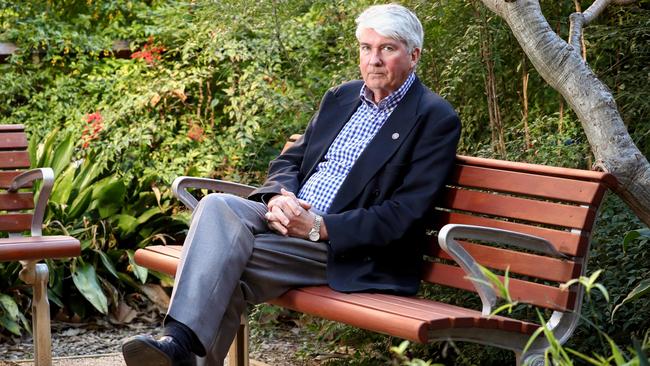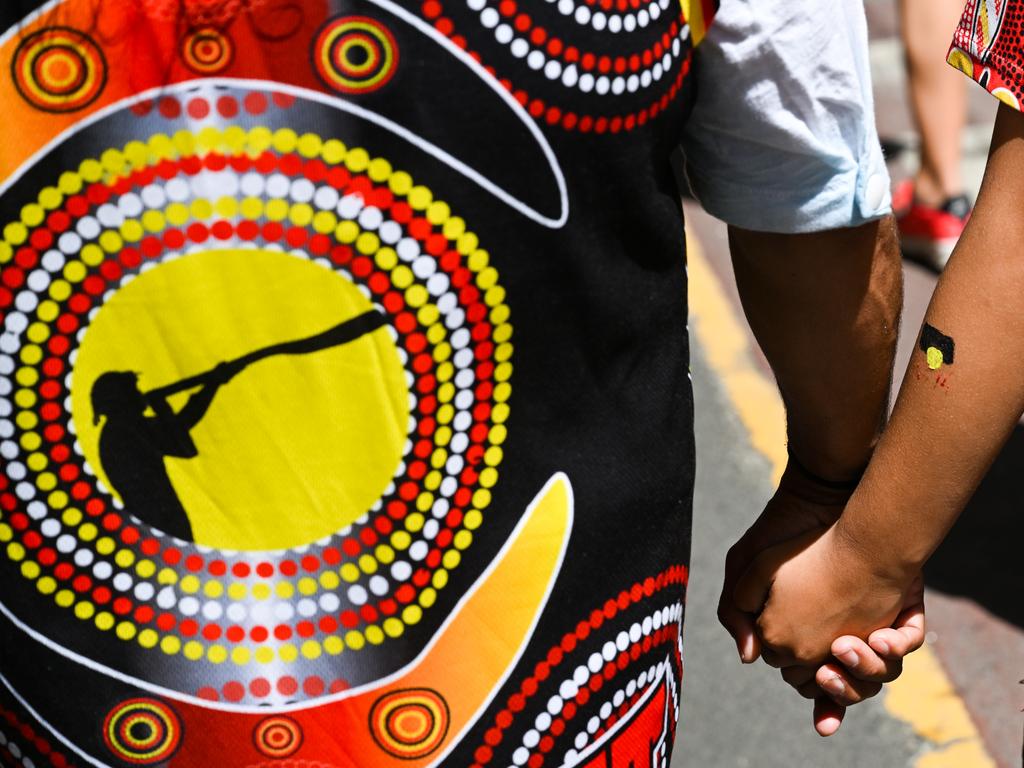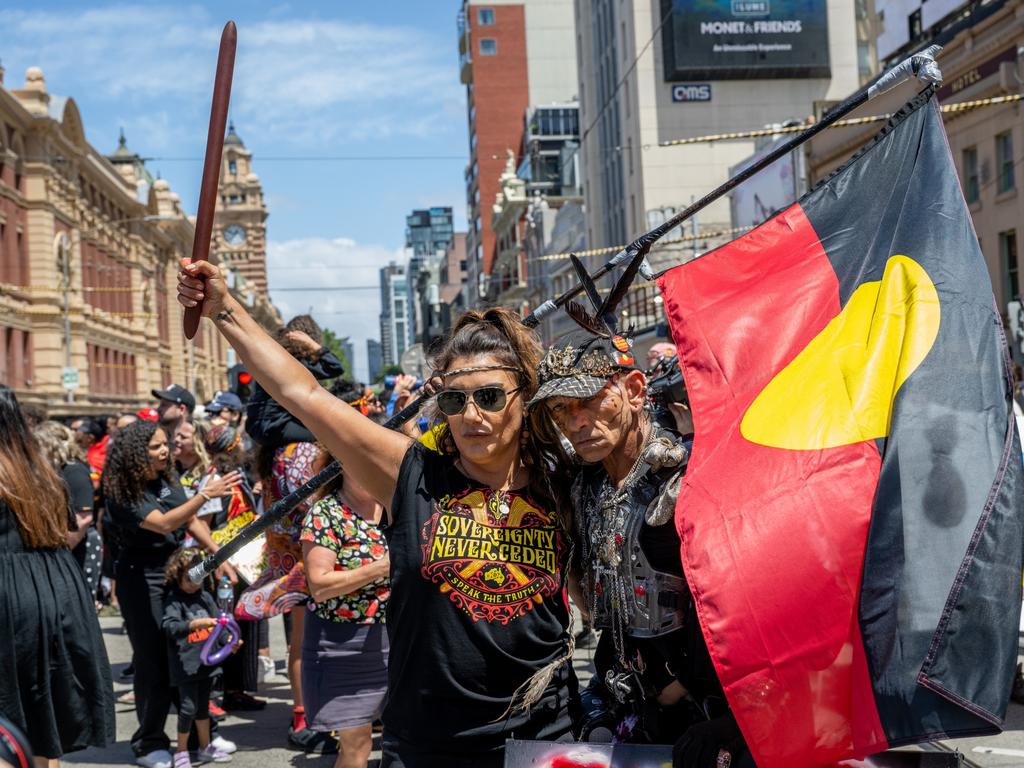Quietly and behind closed doors, Labor alters its Indigenous voice to parliament draft
A momentous shift in the Indigenous voice to parliament draft has occurred based on secret advice and the extraordinary involvement of the Solicitor-General in private briefings.

This momentous shift on the eve of the parliamentary sittings in which the final preparations and political commitments for the national vote will be decided has occurred based on secret advice, meetings behind closed doors, the extraordinary involvement of the Solicitor-General in private briefings, fears of constitutional overreach, findings of practically unworkable implementation, without any public declaration, certainly no public debate and utterly no public information from the government.
The concept of trying to limit the bureaucratic impact of the Indigenous voice to parliament on executive government now apparently has been accepted by the government, and a new form of words has been created to head off the greatest commonwealth administrative change in more than 50 years, and possibly since Federation. All this has been conducted without transparency or debate from the Albanese government under cover of the colossal distraction of the epoch-changing AUKUS nuclear submarine agreement, and obviously was based on Solicitor-General advice warning that the inclusion of “executive government” was a problem and recommending change.
Even as the government’s own referendum working group of Indigenous leaders and representatives finalised its report – incidentally defying the plea from Attorney-General Mark Dreyfus to water down its recommendations on the advice to executive government – for parliament there is no public recognition of the change in the government’s position. What’s more, one of Anthony Albanese’s own eminent jurists who strongly supports the voice, former chief justice Robert French, has conceded there is a risk of the proposed referendum forcing an “executive decision-maker” to consider a representation from the Indigenous voice “before making a decision”.
“It cannot be said that the risk is non-existent. And if it eventuated, it might mean that in certain decisions an executive decision-maker would have to consider a representation before making the decision to which it relates,” French wrote in The Australian on Thursday.
He correctly argues that being forced to seek a representation before making a decision “is a far cry from being required to comply with the proposals or advice contained in the representation” – but, contrary to the protestations of the Prime Minister, he admits it will be a risk, that it will have an impact on public servants making decisions, and he supports the new amendment, which he quoted, to limit the interference.
For French, the benefits outweigh the risks of having a voice to parliament and executive government. But there are others in this opaque debate who take the view that the unknown, incalculable risk of including executive government is so disruptive to government departments and agencies – that’s 189 commonwealth departments and agencies from Prime Minister and Cabinet to the Reserve Bank, employing hundreds of thousands public servant “decision-makers” – that it will outweigh the advantages and lead to the defeat of the referendum.
The government’s change in direction became apparent last week when Dreyfus sought to use the Solicitor-General’s advice on inclusion of executive government to get the referendum working group to accept a new form of words designed to dilute the impact on executive government.
The inclusion of the voice’s right to seek to advise and consult executive government was not originally recommended to the government but it has become a contentious issue and its exclusion has even been raised at the Indigenous leaders’ meetings.
In its draft form, the proposed constitutional amendment that Australians will vote on later this year says the voice “may make representations to parliament and the executive government on matters relating to Aboriginal and Torres Strait Islander peoples”.
The new amendment, allowing parliament to make laws about the legal effect of representations, may reduce the risk of executive government being bound to take the views of the Indigenous voice into account, but it is still left as an orphan by the Albanese government and complicates the referendum proposal.
In The Weekend Australian in January, Peter Conran, one of Australia’s most experienced public servants at federal, state and territory level, who has worked on implementing legislation on Indigenous issues, including native title, first raised his fears of disruption to government decision-making through a constitutional power to demand consultation before a decision was taken.
This week he told Inquirer: “Some weeks ago in The Weekend Australian I raised the concerns I had with the proposed inclusion in the voice referendum providing for representations to executive government. While some agree with me, former chief justice Robert French has argued (in The Australian) for retention of the provision.
“I’m not challenging his legal argument but, as I pointed out, I am very concerned a voice to executive government is unworkable in practice. While Justice French dismisses concerns regarding the voice to executive government, he does acknowledge there is a risk.
“The problem is the capacity of the executive – that is, cabinet, minsters, departments, public servants – to make decisions without the risk of a challenge that a decision-maker has not properly considered or provided reasonable opportunity for consideration of a matter by voice representatives. Or indeed that voice representatives were not made aware that a decision was being made and, if it had been known that the decision was being made, they would have sought to make representations.”
Conran has suggested a series of scenarios where commonwealth public servants could face demands for advance consultation on decisions and even face challenges if they failed to advise the voice of a relevant decision being considered.
Voice representatives could write to the Treasury secretary seeking the following:
• Input to the preparation of the 2024-25 budget to allow it to make broad and/or specific representations on the budget, given known and unknown impacts on First Nations people and communities.
• Set out a timeline for proposed representations and note that this would involve consultations by the voice representatives with indigenous communities and might require meetings between Treasury officials and different Indigenous community and voice representatives.
Conran flags that issues to be discussed could include, but not be limited to, superannuation (for example, the lack of superannuation benefits available to many First Nations people); welfare support services and payments, including health; environmental planning, heritage protection and climate change; corporate and small business support services and subsidies; and taxation relative to the impact on Indigenous businesses and individuals and in the context of future tax reforms.
Long-term Indigenous rights campaigner, lawyer, Jesuit priest and supporter of the voice to parliament, Frank Brennan also has campaigned against the inclusion of executive government in the referendum because he says he believes it will be impossible for public servants to operate, it is unworkable and it will lead to the defeat of the referendum.
Brennan’s argument, opposed to French’s support for executive government to be included, is that the inclusion of the executive government in the constitutional change tries to deal with a highly complex area with just one line, which opens a plethora of legal options and challenges.
“What’s been proposed here is a one-line entry in the Australian Constitution, which gives a constitutional entity a constitutional entitlement to make representations,” Brennan said last week.
“What we’re talking about here is the creation of a new entity in the Australian constitutional framework, namely a voice, of which I am in favour.”
But Brennan argues that to “constitutionalise” the main functions of the Indigenous voice is a “very big risk”.
“This is somewhat equivalent to – though bigger than – the major commonwealth administrative law reforms that occurred in Australia in the 1970s with the set-up of the Administrative Appeals Tribunal, the Administrative Decisions Judicial Review Act, the institution of the Ombudsman, etc,” he told the Sydney Institute.

“Another problem is this. It’s all very well to speak of representations to parliament. They would be open and transparent. Presumably they would be tabled in parliament, or they may be given to the Speaker or the president. But what about representations made to executive government? To whom would they be presented?
“Maybe we just drop hundreds or thousands of them each week to the governor-general. Or is each minister of the crown to receive all representations in relation to his or her department?
“I’m even open to the idea of having a voice that would make representations to executive government. But I would think given the complexity of government that you would do that by statute, if for no other reason than if you encounter unexpected problems the parliament would rectify them.
“Clearly there’s been a difference of viewpoint expressed within the constitutional working group as to whether or not this is problematic. I, being a strong advocate of the voice, do not apologise for publicly saying I think it is highly problematic.”
Yet, despite the looming parliamentary deadline for the referendum preparations, the establishment of a parliamentary committee to work on the proposal, the report from the working group and demands that Peter Dutton declare a position for the Liberal Party, the government has remained silent on this crucial issue and its own tectonic shift.








The Albanese government has changed its position on the Indigenous voice to parliament and executive government – the proposed wording for the referendum to be held this year is now different.